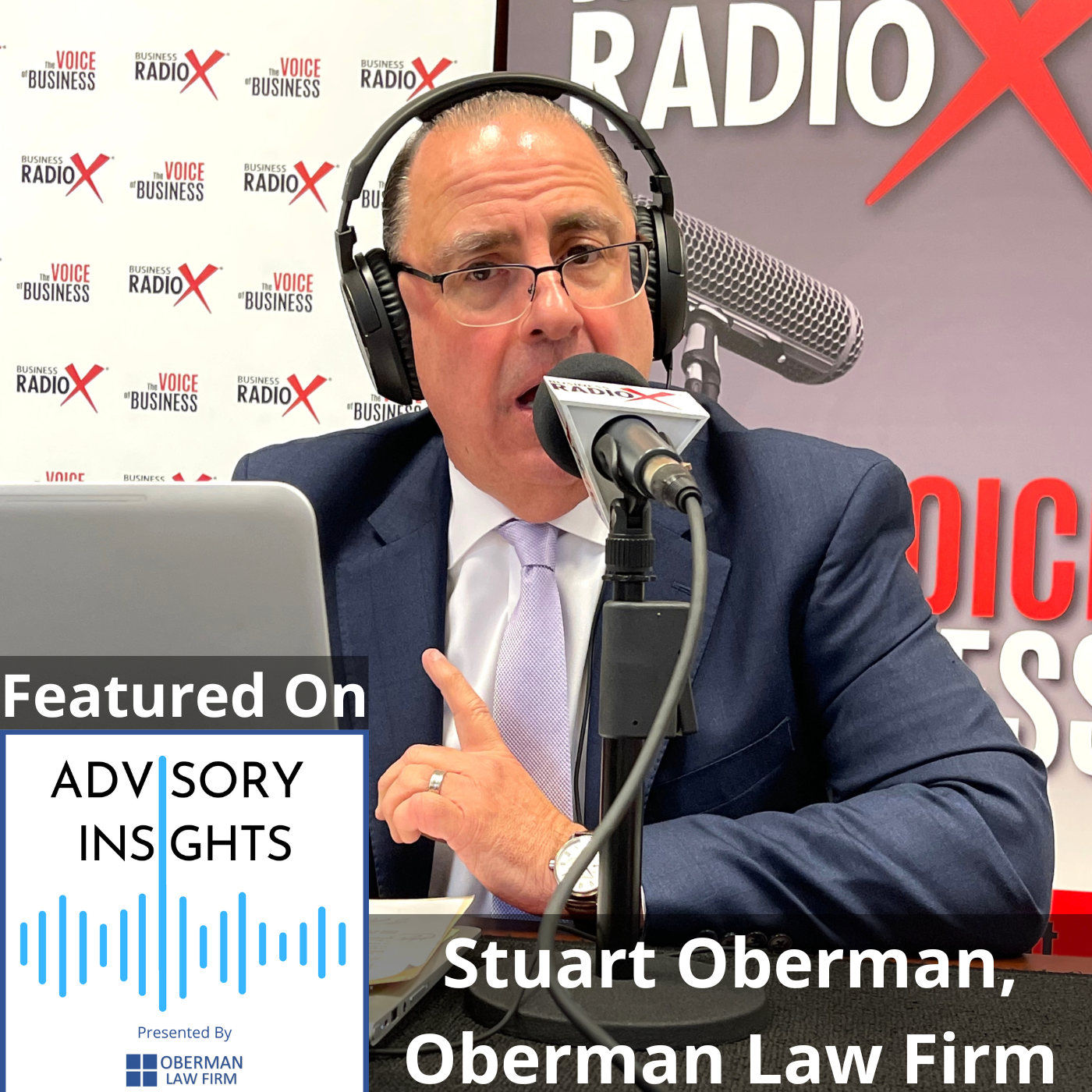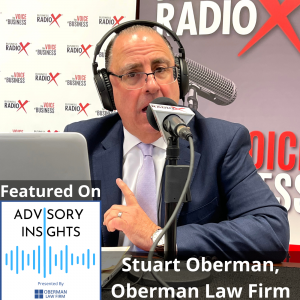

Five Sections in Your Employee Manual Which Should Be Overhauled (Advisory Insights Podcast, Episode 29)
On this episode of Advisory Insights, Stuart Oberman of Oberman Law Firm discussed the five sections of your employee manual that should be overhauled to comply with changing laws. He covered topics such as regulating employee appearance, work arrangements, and communication.
Advisory Insights is presented by Oberman Law Firm and produced by the North Fulton studio of Business RadioX®. The series can be found on all the major podcast apps. You can find the complete show archive here.
TRANSCRIPT
Intro: [00:00:01] Broadcasting from the studios of Business RadioX, it’s time for Advisory Insights. Brought to you by Oberman Law Firm, serving clients nationwide with tailored service and exceptional results. Now, here’s your host.
Stuart Oberman: [00:00:20] Hello and welcome to Advisory Insights Podcast. Stuart Oberman here, your host. Well, I want to talk about H.R. I know that’s a topic I talk a lot about, but until I stop getting calls regarding H.R. compliance matters, I’m going to keep harping on this.
Stuart Oberman: [00:00:37] Today’s topic, five sections that should be overhauled in your employee manual. First and foremost, do you have an employee manual to start with? So, for those that do not have an employee manual, I want you to write this down on each sections we’re going to look at.
Stuart Oberman: [00:00:55] Get an employee manual. If you have an employee manual that is 15 pages, shred it and get another one. If you have an employee manual that is probably less than 40 pages, I’m going to recommend you really have someone take a look at that manual and make sure it’s good because the law is changing constantly.
Stuart Oberman: [00:01:12] Let’s take a look at our sections. First and foremost, I’m going to say that you need to regulate appearance. Now, what each employer does with appearance and what they allow is not for me to comment. But what’s happening is, is that you must have, got to have written policies regarding appearance to take into account.
Stuart Oberman: [00:01:37] And why do I say this? Because what’s happening is we’re seeing legislation all over the country regulating appearance. We have legislation – and I’ve said this before but I want to stress this again – regulating hair. What is professional hair? So, for those that don’t really follow H.R. items, I want to bring into account where a particular state brought in the Crown Act.
Stuart Oberman: [00:02:05] For example, what is the Crown Act? It essentially bans race-based hair discrimination in the workplace. So, the Crown Act or similar legislation has been enacted in 19 states. Folks, I’ll repeat that, has been enacted in 19 states. How many people listening to this podcast have any idea whether or not their state even is included in that kind of legislation or has a bill pending for that legislation at the Federal level, which sits at the Senate right now? So, again, number one appearance. Again, I can’t make up this legislation.
Stuart Oberman: [00:02:50] Work arrangements. I will tell you, folks, depending on your region, people aren’t going back to the offices. Now, we see that in different regions, different mobilities. We’re talking to a law firm the other day that had 200 people. None of them are back to the office. I don’t know what that rent is, but it’s got to be expensive. So, I want to make sure you know this, that your organization, I don’t care what you do, you have to have expectations around communication.
Stuart Oberman: [00:03:23] First off, do you even have a policy in place that regulates a hybrid? Do you have a policy in place that outlines what is strategically your employer’s information, when they’re coming in, when they’re speaking to members of the office, when they’re supposed to answer the phones, when they report deadlines? Again, I want you to make sure that you are regulating work arrangements. And, also, I want to make sure that you have a policy that goes into a place and regulates remote conduct and what should or should not be taking place.
Stuart Oberman: [00:04:02] So, again, technology is at the forefront of all this. Things change. I know we constantly look at software improvements, where this technology is going. Everything today is outdated in six months, it seems like. So, I want to make sure, number three, technology. That you have policies in place in your handbook that regulate and mention remote work and hybrid.
Stuart Oberman: [00:04:33] Are you using multifactor authentication? Are employees using their own devices? How do you regulate that? Is there a standard? What happens if that cell phone is lost? Other shutdown mechanisms? Are you allowing employees to purchase their own technology on your technology? What happens if you have a computer that is specifically for you and your employee, and, all of a sudden, you have an employee downloading stuff on your software, on your hard drive, or a laptop? Do you have stuff that regulates that? What does that look like?
Stuart Oberman: [00:05:08] So, you’ve got to decide what’s regulated, what’s work related, who pays for these expenses? What does it look like in the employee manual, if you even have an employee manual? I would encourage you to do these. Again, write down these items.
Stuart Oberman: [00:05:23] Number four, sick leave. So, what happened is, before the pandemic many states and localities lacked sick leave laws. But now what we’re seeing, we’re seeing an active, a very, very active legislative agenda for states that are manipulating and approving certain leave acts that go way beyond what the employers indicate for that state.
Stuart Oberman: [00:05:55] So, I want you to make sure you know what you’re sick leave is. How many employees do you have? Do you have reasonable accommodations? What happens if you don’t have reasonable accommodations? You know, again, I want to make sure that under the sick leave, you have the Family Medical Leave Act in place, all those things.
Stuart Oberman: [00:06:16] You know, I keep going back to this topic because it’s just a crazy topic. Number five, marijuana usage and testing. I can’t stress this enough. I know I talked a lot about this in 2022. We’re going to talk about this in 2023. A couple of states come to mind, New York and California.
Stuart Oberman: [00:06:43] So, first and foremost, I don’t want to rehash what we did on a previous podcast or what we’re going to do coming forward. But don’t forget Federal Law, still, marijuana is illegal. But many states protect workers. You’ve got to make sure you know what states protect you as an employer or your workers. Now, we’ve got to worry about other things that are coming into play regarding – I’ll use the term – magic mushrooms. We’re going back to the ’60s. Here we go, folks. Again, with the prevalence of states enacting laws regarding this, this has got to be at the forefront of issues.
Stuart Oberman: [00:07:20] So, employers, you need to be out in the forefront of the trend. You’ve got to make a decision on what you’re doing. You can’t put your head in the sand on these issues because every one of these five issues are going to come up at some point in your workplace. It’s not a question of if. It is a question of when. And you’ve got to be prepared. It’s got to be in writing. And your employees have got to know what their outlines are. You’ve got to know what your outlines are. You’ve got to know what your deadlines are, and what you’re going to accept and not accept.
Stuart Oberman: [00:07:53] Folks, the top five, you got to know it. You got to know it. Employee manual, top five sections you’ve got to overhaul. Again, I’m going to run through this real quick, real quick. Appearance, work arrangements-remote/hybrid, technology-remote/hybrid, sick leave, and last but not least – the favorite topic that I like talking about – marijuana usage and testing.
Stuart Oberman: [00:08:21] Folks, it’s been a pleasure. Thanks for joining us on Advisory Insights Podcast. If you have any questions, please feel free to give us a call, 770-886-2400, or email, stuart, S-T-U-A-R-T, @obermanlaw.com. Folks, have a fantastic day and thanks for listening to Advisory Insights Podcast.
Outro: [00:08:45] Thank you for joining us on Advisory Insights. This show is brought to you by Oberman Law Firm, a business-centric law firm representing local, regional, and national clients in a wide range of practice areas, including healthcare, mergers and acquisitions, corporate transactions, and regulatory compliance.
About Advisory Insights Podcast
Presented by Oberman Law Firm, Advisory Insights Podcast covers legal, business, HR, and other topics of vital concern to healthcare practices and other business owners. This show series can be found here as well as on all the major podcast apps.
Stuart Oberman, Oberman Law Firm

Stuart Oberman is the founder and President of Oberman Law Firm. Mr. Oberman graduated from Urbana University and received his law degree from John Marshall Law School. Mr. Oberman has been practicing law for over 25 years, and before going into private practice, Mr. Oberman was in-house counsel for a Fortune 500 Company. Mr. Oberman is widely regarded as the go-to attorney in the area of Dental Law, which includes DSO formation, corporate business structures, mergers and acquisitions, regulatory compliance, advertising regulations, HIPAA, Compliance, and employment law regulations that affect dental practices.
In addition, Mr. Oberman’s expertise in the healthcare industry includes advising clients in the complex regulatory landscape as it relates to telehealth and telemedicine, including compliance of corporate structures, third-party reimbursement, contract negotiations, technology, health care fraud, and abuse law (Anti-Kickback Statute and the State Law), professional liability risk management, federal and state regulations.
As the long-term care industry evolves, Mr. Oberman has the knowledge and experience to guide clients in the long-term care sector with respect to corporate and regulatory matters, assisted living facilities, continuing care retirement communities (CCRCs). In addition, Mr. Oberman’s practice also focuses on health care facility acquisitions and other changes of ownership, as well as related licensure and Medicare/Medicaid certification matters, CCRC registrations, long-term care/skilled nursing facility management, operating agreements, assisted living licensure matters, and health care joint ventures.
In addition to his expertise in the health care industry, Mr. Oberman has a nationwide practice that focuses on all facets of contractual disputes, including corporate governance, fiduciary duty, trade secrets, unfair competition, covenants not to compete, trademark and copyright infringement, fraud, and deceptive trade practices, and other business-related matters. Mr. Oberman also represents clients throughout the United States in a wide range of practice areas, including mergers & acquisitions, partnership agreements, commercial real estate, entity formation, employment law, commercial leasing, intellectual property, and HIPAA/OSHA compliance.
Mr. Oberman is a national lecturer and has published articles in the U.S. and Canada.
Oberman Law Firm
Oberman Law Firm has a long history of civic service, noted national, regional, and local clients, and stands among the Southeast’s eminent and fast-growing full-service law firms. Oberman Law Firm’s areas of practice include Business Planning, Commercial & Technology Transactions, Corporate, Employment & Labor, Estate Planning, Health Care, Intellectual Property, Litigation, Privacy & Data Security, and Real Estate.
By meeting their client’s goals and becoming a trusted partner and advocate for our clients, their attorneys are recognized as legal go-getters who provide value-added service. Their attorneys understand that in a rapidly changing legal market, clients have new expectations, constantly evolving choices, and operate in an environment of heightened reputational and commercial risk.
Oberman Law Firm’s strength is its ability to solve complex legal problems by collaborating across borders and practice areas.
Connect with Oberman Law Firm:
Company website | LinkedIn | Twitter















